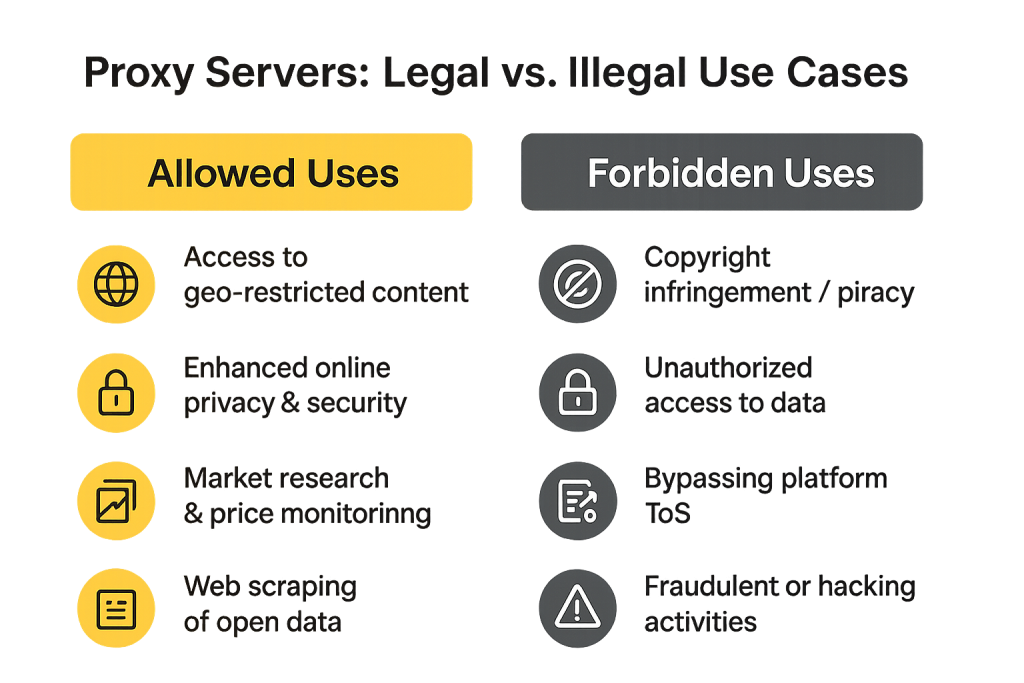IPv4
From $0.72 for 1 pc. 37 countries to choose from, rental period from 7 days.
IPv4
From $0.72 for 1 pc. 37 countries to choose from, rental period from 7 days.
IPv4
From $0.72 for 1 pc. 37 countries to choose from, rental period from 7 days.
IPv6
From $0.07 for 1 pc. 14 countries to choose from, rental period from 7 days.
ISP
From $1.35 for 1 pc. 23 countries to choose from, rental period from 7 days.
Mobile
From $14 for 1 pc. 20 countries to choose from, rental period from 2 days.
Resident
From $0.70 for 1 GB. 200+ countries to choose from, rental period from 30 days.
Use cases:
Use cases:
Tools:
Company:
About Us:
Proxies have long been a familiar tool for working online. They help hide IP addresses, provide access to foreign content, and ensure an additional level of privacy on the internet. At the same time, it is equally important for users to understand are proxies legal in general and what the specific aspects of their use are, without the risks of being blocked or violating service policies. This article provides information about the legal aspects of proxy usage.
In most scenarios, they are used entirely legally. Common examples include:
It is in this context that the concept of “legal proxy meaning” is revealed – ensuring privacy, security, and research without infringing on the rights of services or users.

They themselves are not illegal, but violations occur in certain scenarios of their use:
Therefore, when determining: “are proxies legal?”, it is crucial to specify the intended purpose of their use.
Legal frameworks differ depending on the region:
| Region | Legal framework | Key implications |
|---|---|---|
| United States | CFAA (Computer Fraud and Abuse Act)—computer fraud and abuse law. | Aggressive enforcement against unauthorized access to systems; using intermediaries to defeat safeguards can constitute a violation. |
| Europe | GDPR (General Data Protection Regulation) and copyright laws. | Strict controls on collecting and processing personal data; limitations on proxy use for tracking-related tasks. |
| Asia | National cybersecurity laws and internet-censorship rules. | Tight regulation of access to overseas resources; in some countries intermediaries are restricted or banned for bypassing censorship. |
To avoid violations, follow these principles:
In many cases, they help solve routine tasks. For example, users apply proxies to bypass restrictions when they want access to necessary information without the risk of breaking the law.
From the above material, it follows that the question is proxy legal does not have a universal answer. Everything directly depends on the methods of their use:
Proxies are a neutral tool. Their legality is determined solely by the way they are applied. It is also recommended to pay attention to the reputation of the provider, as reliable providers offer high-quality paid solutions obtained ethically, along with transparent cooperation terms.
Yes. If such an intermediary is used to improve network security and privacy, such use does not violate the law, although rules vary depending on jurisdiction.
Yes, but only for publicly available data and without breaching a site’s terms of service.
An intermediary used in compliance with applicable laws, without piracy, fraud, or unauthorized access, ensures compliance with governance standards.
